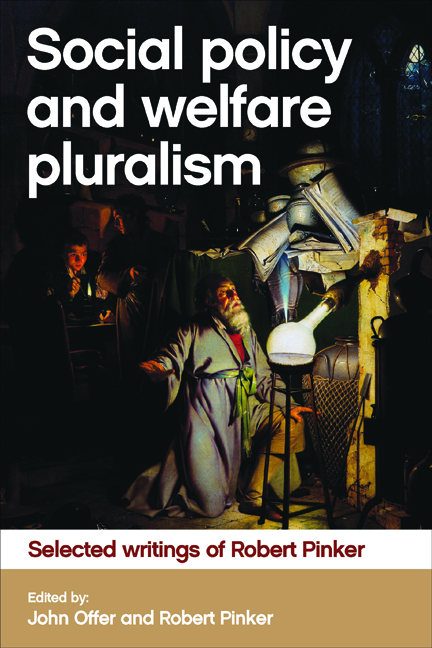Book contents
- Frontmatter
- Contents
- Acknowledgement
- Preface
- General introduction: Robert Pinker on rethinking approaches to welfare
- Introduction to Part One On social policy studies
- one The ends and means of social policy: a personal and generational perspective
- two Social theory and social policy: a challenging relationship
- three Stigma and social welfare
- four The welfare state: a comparative perspective
- five Richard Titmuss and the making of British social policy studies after the Second World War: a reappraisal
- Introduction to Part Two On social care, communities and the conditions for well-being
- six Report of the Working Party on the Role and Tasks of Social Workers: an alternative view
- seven The quest for community: from the Settlement Movement to the Griffiths Report: an historical perspective
- eight Citizenship, civil war and welfare: the making of modern Ireland
- Introduction to Part Three On welfare pluralism
- nine Golden Ages and welfare alchemists
- ten From gift relationships to quasi-markets: an odyssey along the policy paths of altruism and egoism
- eleven The experience of citizenship: a generational perspective
- twelve The right to welfare
- thirteen The prospects for social policy in the UK after the 2015 General Election
- Afterword On the post-Brexit prospects for social policy in the UK
- References
- Index
two - Social theory and social policy: a challenging relationship
Published online by Cambridge University Press: 08 April 2022
- Frontmatter
- Contents
- Acknowledgement
- Preface
- General introduction: Robert Pinker on rethinking approaches to welfare
- Introduction to Part One On social policy studies
- one The ends and means of social policy: a personal and generational perspective
- two Social theory and social policy: a challenging relationship
- three Stigma and social welfare
- four The welfare state: a comparative perspective
- five Richard Titmuss and the making of British social policy studies after the Second World War: a reappraisal
- Introduction to Part Two On social care, communities and the conditions for well-being
- six Report of the Working Party on the Role and Tasks of Social Workers: an alternative view
- seven The quest for community: from the Settlement Movement to the Griffiths Report: an historical perspective
- eight Citizenship, civil war and welfare: the making of modern Ireland
- Introduction to Part Three On welfare pluralism
- nine Golden Ages and welfare alchemists
- ten From gift relationships to quasi-markets: an odyssey along the policy paths of altruism and egoism
- eleven The experience of citizenship: a generational perspective
- twelve The right to welfare
- thirteen The prospects for social policy in the UK after the 2015 General Election
- Afterword On the post-Brexit prospects for social policy in the UK
- References
- Index
Summary
In this chapter, I will try to answer the following three questions. What do we mean by ‘theory’ in the applied discipline of social policy? How do we distinguish between scientific theory, normative theory and ideology? Is it possible – or desirable – to design and implement rational social policies in the fractious world of democratic party politics where partisanship and passion are more evident than scholarly impartiality and rationality is in short supply?
The role of theory in social research
The development and testing of theories is an essential element in the conduct of social research. Theories set out explanatory and predictive propositions about the causal relationships between phenomena, such as the characteristics and incidence of poverty and the processes by which people become poor, remain poor and escape from poverty.
Deductivists and inductivists hold differing views about the sequence in which scientific research should be conducted. Deductivists start by formulating a theory and then proceed from this general proposition to a consideration of particular cases in order to test their theory. Inductivists start by drawing inferences from particular cases from which they proceed towards the formulation of a theory.
The central assumption of the inductivist approach is that ‘scientific knowledge grows out of simple unbiased statements reporting the evidence of the senses’ (Medawar, 1984: 98). ‘In real life’, however, as Peter Medawar suggests, ‘discovery and justification are almost always different processes’, and researchers seldom, if ever, start their enquiries with a clean sheet. They begin with a review of the relevant literature, and some provisional ideas, or hypotheses, about the subject they wish to investigate. Medawar's reductivist approach to the conduct of research shares much in common with Karl Popper's hypothetico-deductive method of scientific enquiry.
In Popper's approach, we must rely ‘upon the best tested of theories, which are the ones for which we have good rational reasons, not of course good reasons for believing them to be true, but for believing them to be the best available … the best among competing theories, the best approximations to the truth’ (Popper, 1978: 95; emphasis added).
- Type
- Chapter
- Information
- Social Policy and Welfare PluralismSelected Writings of Robert Pinker, pp. 47 - 60Publisher: Bristol University PressPrint publication year: 2017

